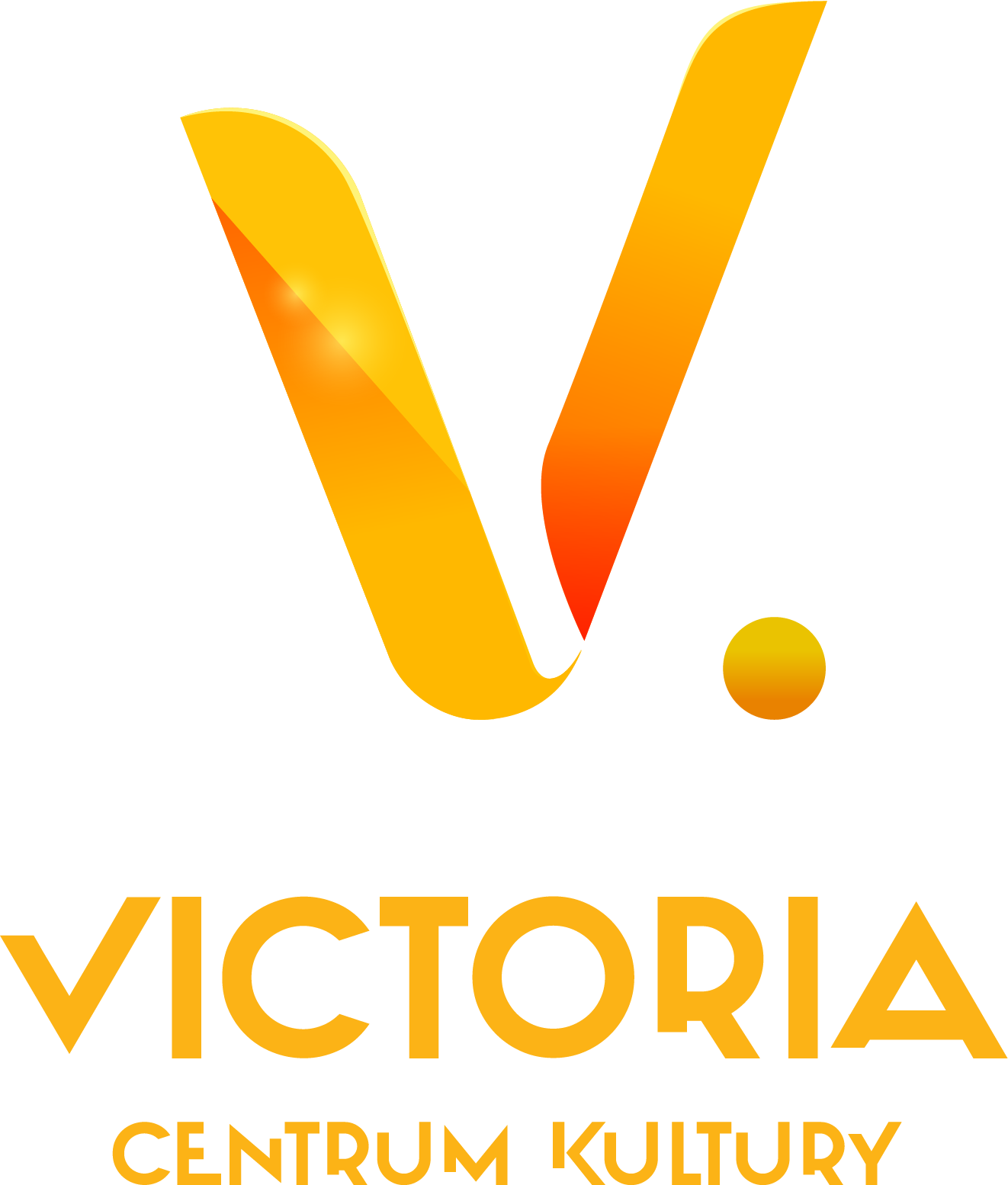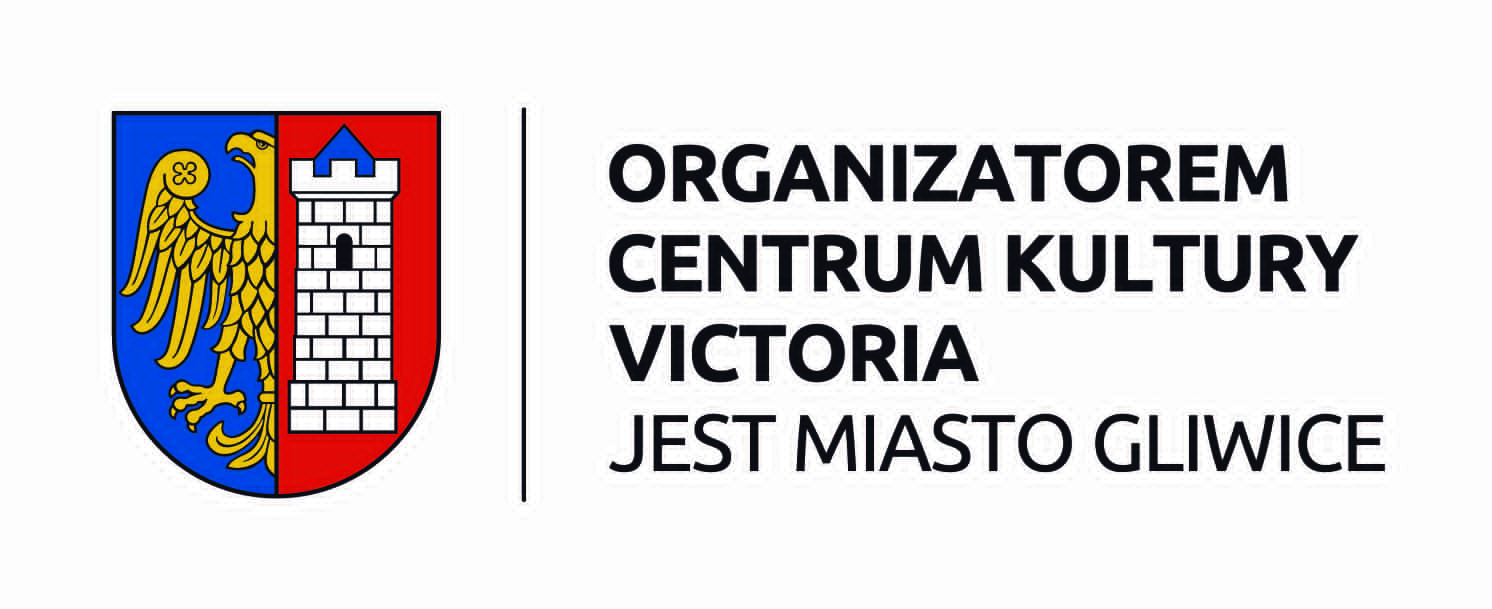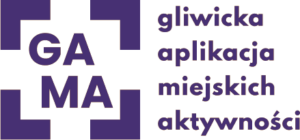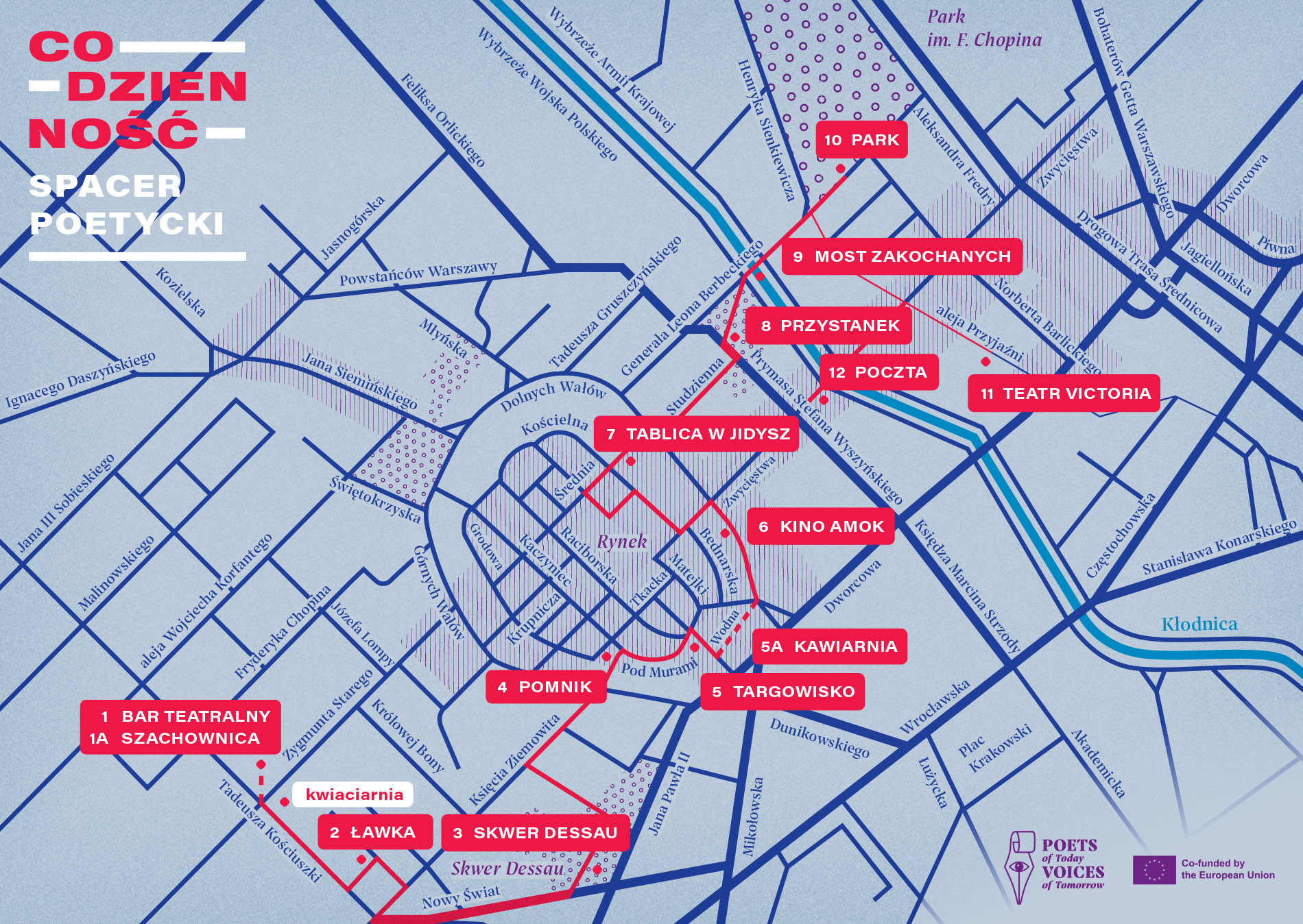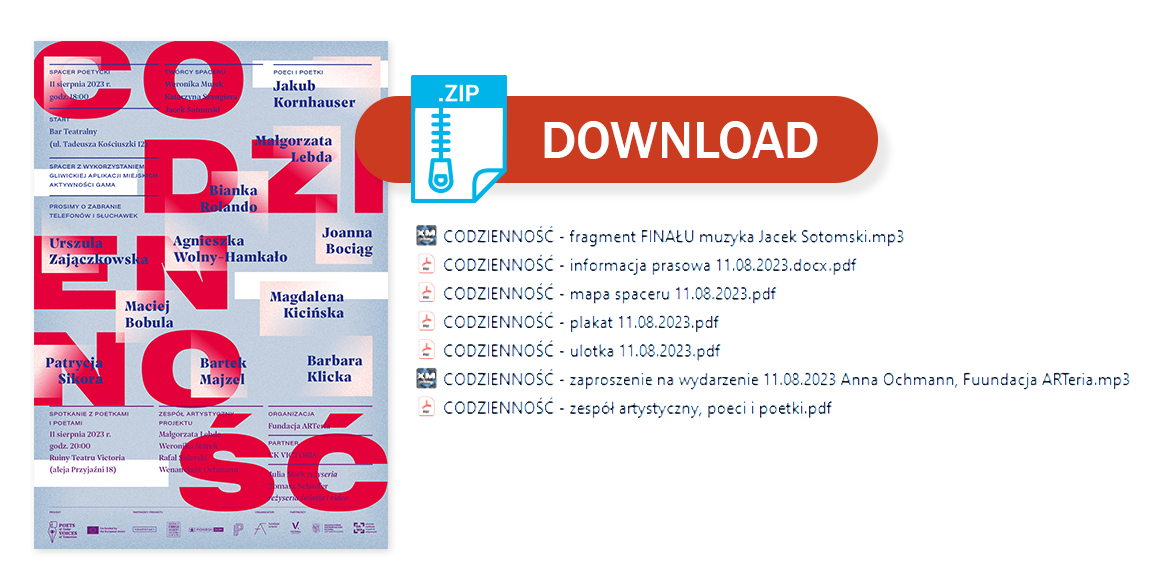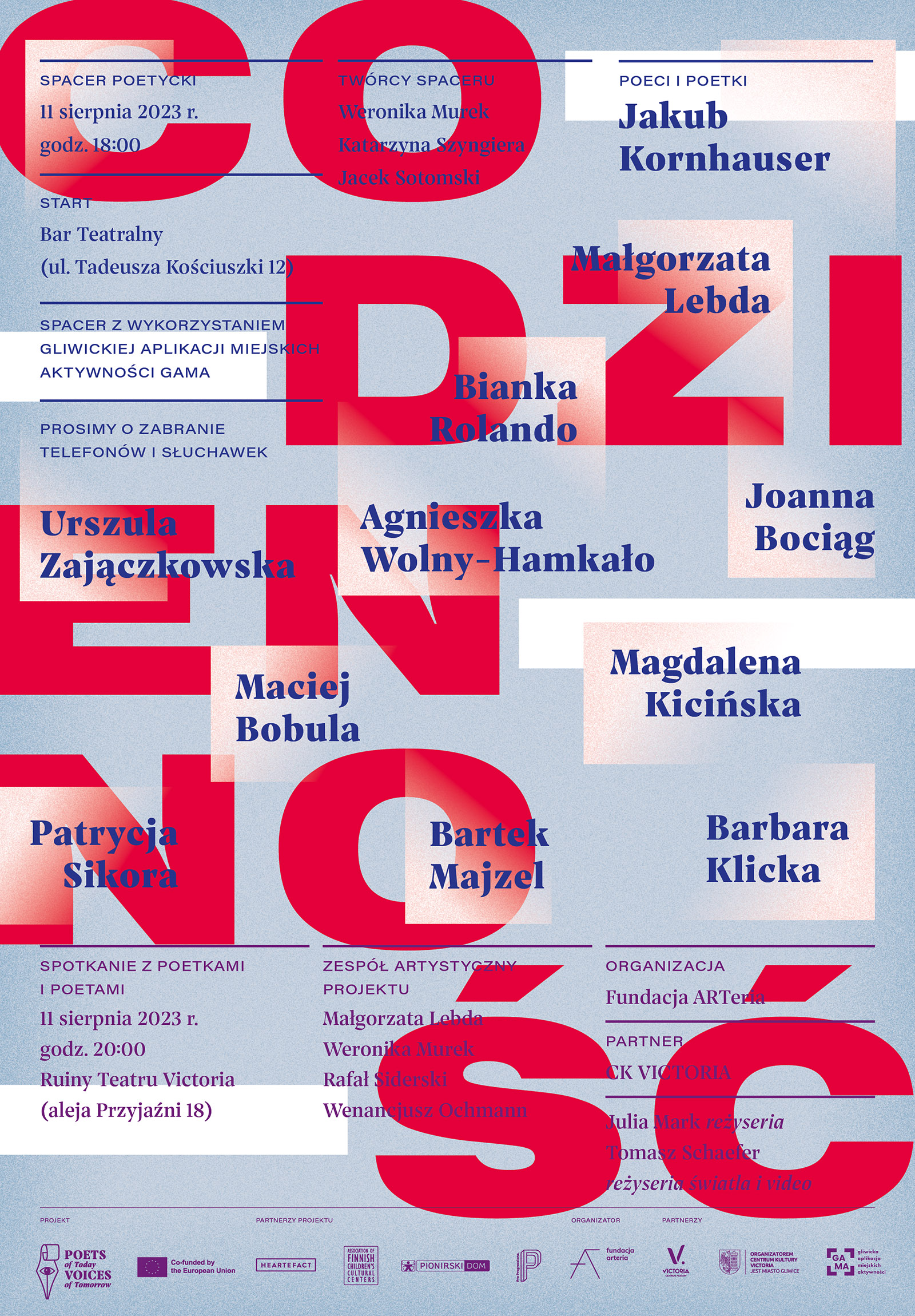A walk using Gliwice’s GAMA urban activities app. Please bring your phones and headphones.
Premiere of the walk with the participation of Polish poets – 11 August 2023. – start at 6 p.m., meeting near the THEATRE BAR, 12 Tadeusza Kościuszki St., Gliwice (map.pdf).
Some people like poetry – do you know this poem by Szymborska? It goes more or less like this: Some people like poetry – some, that is, not everyone. This is where we will stop for a moment: some people take part in a poetry walk. Some – of course: not everyone.
Some people do not necessarily like poetry, but they happen to have a day off and the weather is fine. Some like poetry, but sometimes find that poetry is difficult, that in order to appreciate it, you have to understand it in depth and in all its facets – some have the time, but probably not everyone. Some can understand it, but – well – not everyone.
Welcome to the poetry walk tour. What to expect? Probably a few surprises, each of which will be embedded in our everyday experience: that unbearable and wonderful experience of each of us. We firmly believe that you don’t need any special preparation to appreciate poetry. All that is needed is a moment – a break in the mundane, in the running and bustling – during which we manage to extract a sensual experience of life, an encounter with a person or with nature, a series of associations or a moment in which the mundane gives way to a moment of silence or music. It doesn’t take a huge library, a decade spent in solitude or a rock of Judah to encounter a poet and what they create. All it takes is a moment of concentration in the queue at the post office or the greengrocer’s, a little breath caught somewhere in a park or at a bus stop, a moment of attention to the monuments or plaques we pass in our haste every day.
Come with us on a journey through poetry and through the everyday: let’s look together at how these two things intertwine to create an experience that is at once universal and unique.
1. Theatre Bar – poem ‘Soap Bubbles’ Urszula Zajączkowska
Before any outing, it’s good to eat, rest and collect your thoughts. There is still so much to do today, and the Theatre Bar becomes a gateway through which you can pass into another world. It’s a world made up of moments which are both breaks in the mundaneness of the everyday but at the same time complete it.
1a. Chessboard – transition
Death is playing chess with someone who did not expect to meet him here. Another moment’s reflection, another moment over the board, another turning of the clock to redraw the course of time: history repeats itself and repeats itself.
2. Bench – poem ‘Raids’ Bartłomiej Majzel
Flight of an aeroplane. Church bells. A bang, the horizon. It seems like war, but it is just an ordinary day. Mowed grass – where has its scent gone?
3. Dessau Square – poem ‘Cold Wave’ Barbara Klicka
Greenery. The humid air. You can imagine an afternoon spent somewhere in a spa house, it’s quiet, it’s peaceful, people’s bodies pass each other in the corridors, in the surgery, in the queue for the pool. It’s cold, even if you stand in the full sun.
4. Monument – poem ” Mouth ulcers ” Patrycja Sikora
The flowering is over,’ says the song, ‘buds of white roses, come back, Jasieńku….
Every now and then, we come across places that connect past and present: strange, cracked bridges where stories of all kinds of returns meet. What emerges is a symbolic story and a private story about one’s own identity – created by experience, by gesture, by the body.
5. Marketplace – poem “Marta 1” Joanna Bociąg
The street speaks in different ways: raising its voice – shouting – lowering its voice – whispering. A commotion, the din of conversation and a whistle – maybe a kitchen kettle, maybe a departing train. Three golden bald mannequins: the flash of someone’s arm in the crowd.
5a. Café – transition
Noise again: the café, the street, the rush. From time to time an interrupted story emerges; what do men talk about when they think everyone can hear them, and what do they talk about when they think no one is listening?
6. Cinema – poem ‘Ponuar’ Maciej Bobula
In cinema, this age-old tale of becoming can be tackled: there is the Lichtspiele cinema, which becomes the Fairy Tale cinema, which becomes the Amok cinema – there is also the film about the superhero, there is Master Bruce, who becomes Batman, there is the dragon, which writhes on the ground, and the boy, who becomes a man, and the man, who perhaps becomes a person.
7. Plaque in Yiddish – poem ‘Women’s shoes women’s ankles’ Jakub Kornhauser
We pause for a moment under the plaque commemorating Gliwice’s previous life, one of its many incarnations, a palimpsest. There used to be a furrier here, there is still a furrier here, the smell of leather and glue can still be smelled, small craftsmen’s workshops are still in operation, bespoke sewing is still going on.
8. Bus stop – poem without title Agnieszka Wolny-Hamkało
The bus stop seems familiar, but the bus does not come, it is difficult to find out anything from the timetable. Isn’t the story repeating itself again, growing, isn’t this place reminiscent of the one the characters in David Lynch’s Lost Highway end up in?
9. Bridge of Lovers – poem without title Magdalena Kicińska
The bridge and the sound of the padlocks that the wind sets in motion gently, inexorably. One would like this melody to be pleasant, to be associated with a romantic encounter, but it is not: out of context, the sound becomes metallic, alien, too concrete.
10. Park – poem ‘Feeding the dogs’ Małgorzata Lebda
We descend into the greenery; in the green. It’s bright, the air seems damp, from time to time the end of the world comes.
11. Ruins of the Victoria Theatre – poem ‘Berenice’s Braid’ by Bianca Rolando
Here again, the city grows on the city: window in window. You can imagine the crowd going outside at night, after one of the operettas has ended, you can imagine the smoke escaping outside at night, after the Soviet Army has lit the bonfires, you can imagine the light shining outside after one of the summer concerts.
12. Post office – final
We have reached our destination. Have fun!
After the walk, come along to meet the poets in the Ruins of the Victoria Theatre (aleja Przyjaźni 18) at 8pm.
About the project
The walk was developed as part of the international European cooperation project Poets of Today – Voices of Tomorrow, co-financed by the European Union’s Creative Europe programme implemented by partner organisations from Slovenia, Poland, Hungary, Serbia and Finland.
Its aim is to bring poetry and contemporary poets closer to young people, teachers and local communities through the development of new performative poetic forms. An artistic team has been established in each partner country, which is responsible for developing the methodology and creating an artistic poetic and educational programme.
More about the Polish artistic team.
Renowned Polish poets Maciej Bobula, Joanna Bociąg, Magdalena Kicińska, Barbara Klicka, Jakub Kornhauser, Bartek Majzel, Patrycja Sikora, Bianka Rolando, Agnieszka Wolny-Hamkało and Urszula Zajaczkowska also accepted the invitation to participate in the project, working with teachers from 11 Silesian schools to raise the importance of reading poetry at school.
Creators of the walk
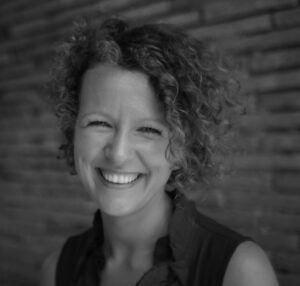 Katarzyna Szyngiera – director. A graduate of the State Higher School of Theatre in Krakow, the Theatre Academy in Warsaw and the Wajda School. She is a laureate of the Onet OŚNIENIA award, the ZŁOTY PROLOG award named after Zygmunt Hübner, the Theatre Award of the City of Gdańsk, the title POMORZANKA ROKU and the Award of the City of Gdańsk in the Field of Culture SPLENDOR GEDANENSIS, a laureate of the Konrad Laurel of the 20th “Interpretations” Festival, the main award of the “m-theatre” Young Confrontations Festival and of the “Live Classics” Competition for the staging of old works of Polish literature. She cooperates with theatres all over Poland.
Katarzyna Szyngiera – director. A graduate of the State Higher School of Theatre in Krakow, the Theatre Academy in Warsaw and the Wajda School. She is a laureate of the Onet OŚNIENIA award, the ZŁOTY PROLOG award named after Zygmunt Hübner, the Theatre Award of the City of Gdańsk, the title POMORZANKA ROKU and the Award of the City of Gdańsk in the Field of Culture SPLENDOR GEDANENSIS, a laureate of the Konrad Laurel of the 20th “Interpretations” Festival, the main award of the “m-theatre” Young Confrontations Festival and of the “Live Classics” Competition for the staging of old works of Polish literature. She cooperates with theatres all over Poland.
Weronika Murek – writer, playwright and publicist. A graduate of the Faculty of Law and Administration at the University of Silesia, Faculdad de Derecho at the Universidad de Barcelona, and postgraduate studies at the Jagiellonian University Creative Writing (SLA). She is the author of a collection of short stories entitled Uprawa roślin południowych metody Miczurina (nominated for the Polityka Passports, the Gdynia Literary Award in the Prose category, the Conrad Award, a finalist of the Nike Award, and the winner of the Witold Gombrowicz Award for the best book debut), the drama Feinweinblein (the Gdynia Literary Award), and Sztuka Mięsa (the award for the best debut in the Contemporary Art Exhibition Competition). She collaborates with theatres all over Poland.
Jacek Sotomski – composer, multi-instrumentalist, performer, improviser, arranger, former tutor, episodic actor in the paradocumentary series “Why Me?“, winner of awards at composition competitions and theatre festivals and winner of the second place in the “Pokemony in Borek” competition; recipient of artistic scholarships, nominated for music awards for artistic achievements, certified record holder with the UNI-VIBE mark; former seasonal worker in small and large enterprises.
Creators of the meeting at the Theatre Ruins
Julia Mark – Theatre director. She studied Theatre Studies at the Theatre Academy in Warsaw. She graduated from the Faculty of Directing at the State Higher School of Theatre in Krakow. During her studies she cooperated with Bogdan Hussakowski (PWST Theatre), she was also an assistant of Mikołaj Grabowski in the Old Theatre in Krakow. She made her debut as a director with Sarah Kane’s ” Miłość Fedry ” at the Polonia Theatre in Warsaw. Since then, she has been staging performances both in puppet theatre, where she performs classics of literature for children and adults (including Lewis Carroll’s Alicja w Keainie Czarów at the Banialuka Theatre in Bielsko-Biała, Barrie’s “Piotruś Pan” at the Aleksander Smolka Puppet and Actor Theatre in Opole), as well as drama (“Mój niepokój ma przy sobie broń” Mateusz Pakuła at the Stefan Żeromski Theatre in Kielce, „Zastrzel mnie i weź ze sobą” by Maria Spiss at the Teatr Nowy in Krakow). Julia Mark won the directing competition organised by the Jan Kochanowski Theatre in Opole (2009), and was also awarded the Journalists’ Wild Rose for Mateusz Pakuła’s „Mój niepokój ma przy sobie broń” (Stefan Żeromski Theatre in Kielce, 2013), the Silver Key for the best performance of the 2014/2015 season in Jelenia Góra for „Karskiego historię nieprawdziwą”, and Don Kichot, an award for directorial debut in Polish Radio. Julia’s plays have been presented at many theatre festivals, including the Festival of Polish Contemporary Plays R@port in Gdynia, the Festival of Young Directors M-Theatre in Koszalin, the Festival of New Theatre in Rzeszów, the Wałbrzych Theatre Fanabies or the Divine Comedy in Kraków. More on the artist’s website http://juliamark.eu/.
Tomasz Schaefer – lighting and video direction
Visual identity
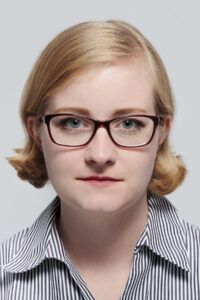 Katarzyna Wolny-Grządziel – designer, researcher, member of the research and teaching staff at the Academy of Fine Arts in Katowice. Teaches book graphics, editorial graphics and the basics of typography and design. Winner of national and international book competitions: Artists’ Books on Tour (Vienna, Prague, Ljubljana 2011), Art Book Wanted (2013, Prague), Silesian Thing (2015, 2018, 2022), STGU Project of the Year (2018) and Most Beautiful Book of the Year (2017, 2021, 2022,). Scholarship holder of the Ministry of Culture and National Heritage (2014).
Katarzyna Wolny-Grządziel – designer, researcher, member of the research and teaching staff at the Academy of Fine Arts in Katowice. Teaches book graphics, editorial graphics and the basics of typography and design. Winner of national and international book competitions: Artists’ Books on Tour (Vienna, Prague, Ljubljana 2011), Art Book Wanted (2013, Prague), Silesian Thing (2015, 2018, 2022), STGU Project of the Year (2018) and Most Beautiful Book of the Year (2017, 2021, 2022,). Scholarship holder of the Ministry of Culture and National Heritage (2014).
Map of the walk
Event poster
Project partners:






Organisation:

Partners:
